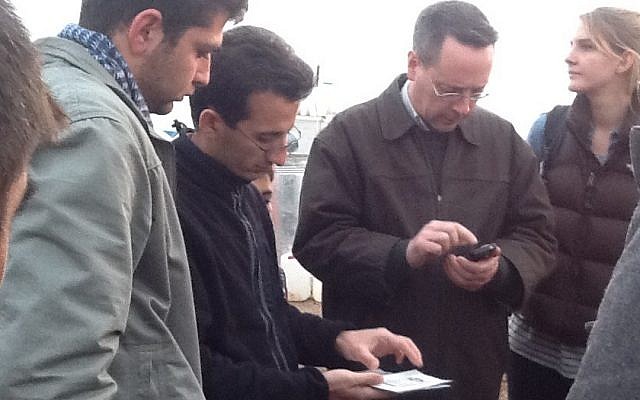The body of a Yazidi child who died at Hadassah Ein Kerem Hospital in Jerusalem after an attempt at life-saving surgery was not allowed through Ben Gurion Airport on Friday, and was en route to the land crossing into Jordan near Beit Shean.
The boy’s mother was forced to fly from Ben Gurion to northern Iraq without the body of her only child earlier this week.
Staffers from Shevet Achim, a Jerusalem-based Christian organization that brings children from neighboring countries into Israel for heart surgery, will try to arrange to fly to body to Iraq from Amman.
It was not clear why the boy’s body was not allowed out of Israel, but it appeared that Maman Cargo, an Israeli logistics company, was refusing to allow Sineor’s body to be loaded onto a Royal Jordanian plane to Erbil via Amman, citing security concerns.
Doctors had put a pacemaker in the boy’s body, and some, including Shevet Achim founder Jonathan Miles, had speculated that this may have been the source of the problem. But when Alain Serraf, the veteran cardiac surgeon who performed the procedure, called Maman to explain that he had put in the pacemaker and there was no threat, he was told that the holdup was unrelated to the surgery.
Get The Times of Israel's Daily Edition by email and never miss our top stories
Maman’s security officer told The Times of Israel that he does not speak to the press. The Shin Bet agency, responsible for domestic security, did not return calls.

Sineor, a 17-month-old Yazidi child who died during an attempt at life-saving surgery in Israel. (Courtesy Shevet Achim)
Shevet Achim and the DHL shipping company tried unsuccessfully to find a solution to transport the body through Turkish Airlines.
Learning to walk in Jerusalem
Seventeen-month-old Sineor was born to Yazidi refugees who fled the Islamic State when the group invaded the Kurdistan Region of northern Iraq in 2014. IS heavily persecuted Iraq’s Yazidi minority, massacring thousands, enslaving others and causing hundreds of thousands to flee their home region.
The boy was diagnosed with multiple congenital heart defects and was in danger of dying without a series of complex operations. Hospitals in Iraqi Kurdistan are not capable of such procedures, and local volunteers connected his parents with Shevet Achim.
Sineor and his mother landed in Israel on November 7, and the next day he was given a diagnostic echo at Hadassah-Ein Kerem.

Sineor, a 17-month-old Yazidi child, practices walking at Hadassh-Ein Kerem Hospital (Courtesy Shevet Achim)
Alain Serraf, the experienced cardiac surgeon qualified to perform the complex surgery, was on vacation when Sineor arrived, so the boy and his mother spent two weeks at Shevet’s guesthouse in Jerusalem, exploring the city as he learned to walk.
Much more confident in his walking abilities, Sineor was finally admitted to Hadassah on November 28, where he wandered around the waiting room as the surgeon explained the operation to his mother. He told her that there was a 5% chance he could die during the operation, and she cried for several minutes.
At 8 a.m. the next morning, Sineor’s surgery began while his mother began the difficult eight-hour wait.
The surgery was more complex than expected, as there was bleeding that the doctors had to get under control. In the small hours of the morning, Sineor’s mother finally received the news that her son had improved markedly, and was being moved to the ICU.

Fuad Jamal (L), Hiwa Sherzad, and Jonathan Miles inspect the ID papers of a Syrian Kurdish refugee family whose baby is a candidate for heart surgery in Israel (photo credit: Times of Israel/Lazar Berman)
At 2 a.m. she was able to see her only child. The sight of the boy connected to tubes and machines shocked her, but she stroked his curly hair and spoke gently to Sineor through her tears.
Sineor remained on extracorporeal membrane oxygenation — or ECMO — a machine that oxygenates a patient’s blood outside the body.
On Sunday, after days on the ECMO machine, doctors determined he could be taken off, and installed a permanent pacemaker. After that surgery, doctors welcomed him and his mother back to the ICU with applause, according to Luisa, one of the Shevet staffers.
The next morning, on Monday, doctors called Shevet Achim to tell them Sineor had taken a turn for the worse. His blood pressure dropped drastically, and his heart was beating weakly. When staffers arrived at the hospital an hour later, they were told the medical staff was treating the child with adrenaline and dopamine, but that he wasn’t responding. Sineor’s mother was with him, kissing him and whispering his name as doctors worked furiously to save him.

Sineor’s mother strokes his head after attempted life-saving surgery in Israel. (Courtesy Shevet Achim)
Half an hour after the Shevet staff arrived, doctors called Sineor’s mother into a side room to tell her that her boy had died. She was inconsolable, weeping on the floor and fainting as Miles and another Kurdish mother whose son was treated at Hadassah tried to help her.
“It was a complex surgery, and unfortunately he passed away after surgery,” said Serraf.


